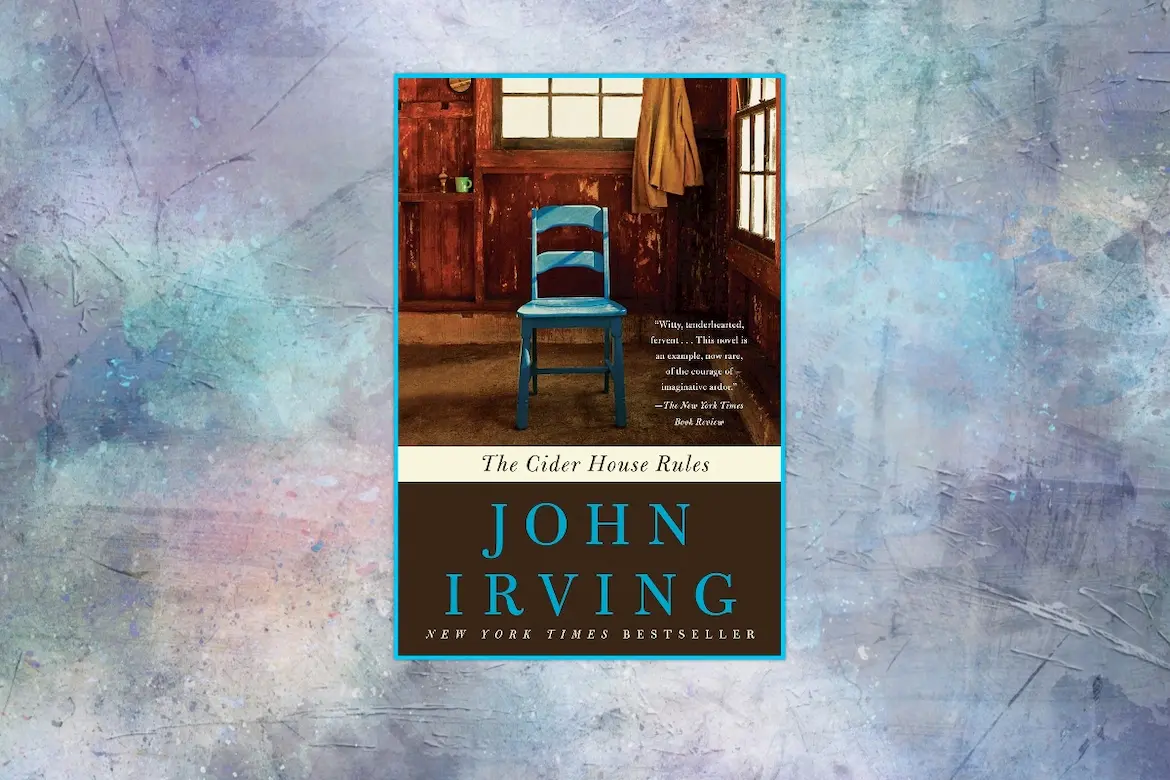John Irving’s novel The Cider House Rules is a sweeping, hilariously funny at times, gloriously melancholy at others, coming-of-age story that follows the life of Homer Wells, an orphan who grows up at the St. Cloud’s Orphanage in Maine during the early 20th century.

You can find and buy the books we recommend at the LitStack Bookshop on our list of LitStack Recs.

In This LitStack Review of The Cider House Rules
The Orphanage of Unwritten Rules
The Cider House Rules spans several decades. The story begins with the early life of Homer Wells at the St. Cloud’s Orphanage, from where he is repeatedly adopted and returned.
Raised by the orphanage’s director and a physician, Dr. Wilbur Larch, Homer eventually becomes Larch’s protégé, learning the medical trade, including obstetrics and the controversial practice of performing abortions. Dr. Larch is a complex, compassionate figure who believes in helping women by any means necessary, even if it means breaking the law. Homer, however, grapples with the morality of abortion, which shapes his character and choices.
Homer eventually leaves the orphanage with a young couple, Wally Worthington and Candy Kendall. They take him to Wally’s family’s apple orchard, called Ocean View. Homer gets a job as a cider maker and apple picker, and he becomes deeply involved in their lives.
He falls in love with Candy, and they begin a secret affair after Wally goes off to fight in World War II. When Wally returns from the war paralyzed, Homer is torn between his love for Candy and his loyalty to Wally. Ultimately, Homer must confront his own identity and destiny, choosing to either stay at the orchard or return to the orphanage to take over for the aging Dr. Larch.


Escaping the Cradle, Finding a New Home
Irving’s characters are deeply humanistic and memorable. Homer Wells is a passive but kind protagonist who is a keen observer of the world around him. His journey is one of self-discovery, as he navigates his personal beliefs against the realities of the world.
Dr. Wilbur Larch is the novel’s moral and intellectual heart. He is a flawed but selfless man who personifies the theme of doing what’s right despite the law. His love for his orphans and his commitment to women’s reproductive freedom make him one of Irving’s most compelling creations.
Candy Kendall is a strong-willed woman who finds herself in a difficult love triangle. She represents the choices and sacrifices women often have to make. And Wally Worthington, the gentle and kind soldier. There are also the various orphans, apple pickers, and nurses at the orphanage who fill out Irving’s richly detailed, and character-filled world. This novel, with room enough for the major characters Homer and Larch and Candy, is also filled to the brim with brilliant characterizations of its minor characters.


The Weight of Decisions and a Circle Unbroken
The emotional heart of the novel is Homer’s inner turmoil. When Wally returns from the war paralyzed, Homer is caught in a profound love triangle, torn between his deep affection for Candy and his loyalty to his friend. The narrative explores the sacrifices people make for love and the messy reality of their choices.
Ultimately, Homer must decide whether to stay at the orchard, living a life of quiet deception, or return to St. Cloud’s to fulfill the destiny that Dr. Larch has long planned for him. The climax forces Homer to confront his past and finally embrace his future, leading the story to a poignant, circular conclusion.
The novel explores family and the meaning of home. Family is not just blood. Homer searches for a place to belong (at the least to be of use)—at the orphanage or with the Worthingtons. The novel also delves into the complexities of abortion and reproductive freedom. Irving doesn’t present a simplistic view; he explores the moral gray areas through the opposing views of Homer and Dr. Larch.


Weaving the Threads of Fate | Irving’s Masterful Craft
By this time in Irving’s career, it was clear he was a master storyteller. With The Cider House Rules he weaves a rich and intricate narrative. One of his most notable skills is his ability to engage the reader through foreshadowing and a sense of impending fate.
Irving’s use of time is the stuff novels are made for, to be expansive, to be intimate, and to let the reader experience the effects of time upon its characters and upon their reading of the text. The narrative refers forward in time, and backward, and key moments are revisited from different perspectives, giving the story a layered, almost circular feel. In the narration, events are often hinted at or alluded to before they occur, creating a palpable sense of time and its effects–tension and anticipation.
The past and present are constantly interacting. The novel’s structure relies on Irving’s command of time, using a non-linear narrative intrusion that mirrors the way we remember and process our lives, giving the reader a sense of the bittersweet comfort of nostalgia. But these intrusions also plant seeds of suspense, shades of feelings, and emotions.
Irving’s characterizations are perhaps his greatest strength. His characters are not archetypes; they are flawed, compassionate, and deeply relatable individuals. He uses details—from the specific smell of ether at the orphanage to the seasonal work of apple picking—to ground the story in a tangible reality. But it is always the characters in this novel that bring you to its core, its center.
He uses humanistic characterizations to build people who seem unique and yet entirely familiar, deeply flawed yet relatable individuals. Dr. Larch is an example of this—a man whose questionable actions are driven by a genuine, heartfelt compassion.
This attention to detail and his gentle, empathetic approach to even the most difficult subjects make The Cider House Rules a poignant and enduring work. The novel is a testament to Irving’s belief that life is messy and complicated, and that people are driven by a complex mix of love, loyalty, and their own moral compass.


An Intricate, Engaging Tapestry
John Irving’s storytelling is both epic and intimate. His narrative style is characterized by a unique and consistent control of time in his narratives, his ability to allow the narrator to intrude upon the story and encapsulate time, foreshadowing future events, giving the reader if not specific information at least a specific feeling about what will happen before the characters know what will happen or what they will feel, creating dramatic irony and a sense, for the reader, of inevitable fate. The underlying drumbeat of every major Irving novel, the inevitable march of death.
This intricate, deceptively simple novel, is a tapestry of character and choice and setting and time combining to make The Cider House Rules a powerful and unforgettable read.
~ J.S. Hood
About John Irving, Author of The Cider House Rules

John Irving was born in Exeter, New Hampshire, in 1942. His first novel, Setting Free the Bears, was published in 1968, when he was twenty-six. He competed as a wrestler for twenty years, and coached wrestling until he was forty-seven. He is a member of the National Wrestling Hall of Fame in Stillwater, Oklahoma. In 1980, Mr. Irving won a National Book Award for his novel The World According to Garp. In 2000, he won the Oscar for Best Adapted Screenplay for The Cider House Rules. In 2013, he won a Lambda Literary Award for his novel In One Person.
Internationally renowned, his novels have been translated into almost forty languages. His all-time bestselling novel, in every language, is A Prayer for Owen Meany. A dual citizen of the United States and Canada, John Irving lives in Toronto.
You can connect with John Irving on his website, and on Facebook.
The Cider House Rules
Publisher: Ballantine Books
ISBN Softcover 9780345417947
Other Titles by John Irving

Other LitStack Resources
Be sure and check out our other LitStack Reviews, including reviews by Lewis Buzbee, Lauren Alwan, Allie Coker, Rylie Fong, and Sharon Browning.
As a Bookshop, Malaprop’s, BAM, Barnes & Noble, Audiobooks.com, Amazon, and Envato affiliate, LitStack may earn a commission at no cost to you when you purchase products through our affiliate links.



